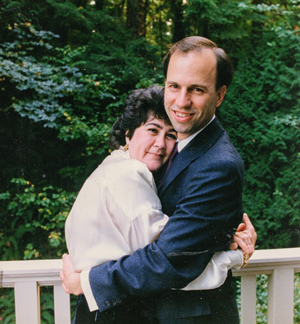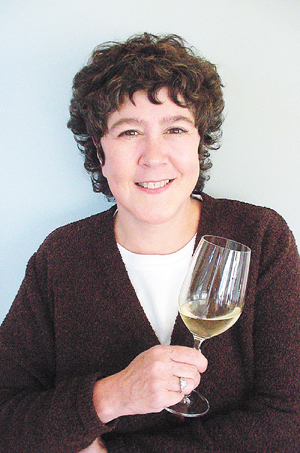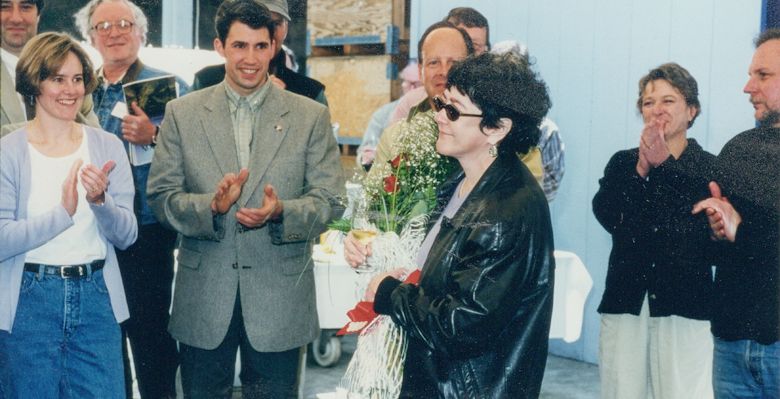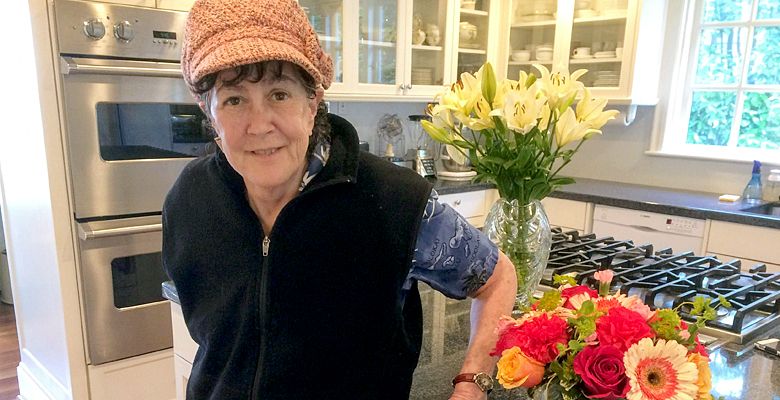Lisa Shara Hall
Honoring an Oregon wine original
By OWP Staff
Lisa Shara Hall was born in July 1952, the only child of Anne and Arthur Shara, and grew up in the upscale town of West Orange, New Jersey. Her father, Arthur, was a civil rights attorney and news distributor; her mother, Anne, worked for Rutgers University as a development director and participated in famous civil rights marches. Arthur and Anne were founders of the New Jersey American Civil Liberties Union in 1960.
With her childhood home merely 18 miles from Manhattan, Lisa took advantage of the city’s cultural resources. Her husband, Kirk Hall, explains, “As a teenager in the mid-1960s, Lisa was allowed to take the bus by herself into New York City after school for extra art classes at the New School or a visit to the Museum of Modern Art — to look at her favorite painting, Picasso’s Guernica — just so long as she was home by dinner. She was energetic, outgoing and passionate about causes, even then.”
Lisa moved to Portland in 1970 to attend Reed College. Kirk says, “She chose Reed over Radcliffe and drove west in a yellow Volkswagen bug because she wanted to strike out on her own and be in an intense intellectual environment — that was Reed.” Lisa majored in comparative religions, graduating in 1974. Subsequently, she worked in civil rights enforcement for the City of Portland, followed by major commercial litigation and, finally, community relations for Emanuel Hospital.

Lisa met Kirk on Valentine’s Day 1988, at a Sunday brunch hosted by mutual friends, Anne and Peter Jarvis. Kirk says, “Meeting on that day, how could we do anything but fall in love? Our first big date was a fabulous dinner with vintage wines at her apartment. The next weekend, our first big overnight trip was to Cannon Beach, where we posed before Haystack Rock — I really fell for her.” Soon, the two were inseparable and living together by May.
In fact, the two had nearly met seven years earlier in 1981 — another mutual friend, an attorney at the firm where Kirk worked, attempted to set them up on a blind date. “Lisa knew who I was — she always remembered everything about other people, even friends of friends. She agreed to let our friend talk to me about going out. He then asked me if I wanted to go on a blind date with ‘somebody.’ I hesitated and then said, ‘No.’ The concept of a blind date didn’t appeal to me. He then called Lisa and said, ‘He didn’t want to go out with you’ — a man of few words. But Lisa wasn’t bothered. She remembered my name when she arrived at the Valentine’s brunch, and her first words to me were: ‘So YOU’RE the guy who wouldn’t go out with me seven years ago!’”
Kirk proposed to Lisa on his birthday in July 1988, and the two married in October of the same year, with a small reception in her home bordering Portland’s Japanese Garden. Kirk says, “I have said many times that with our marriage, my life went from black and white to Technicolor.”
The Halls never had children, except for the four-legged kind. “We both grew up with dogs. As a girl, Lisa adored her black and white English springer spaniel named Isabelle,” Kirk says. “Over the years, we have had six English spaniels, including rescue dogs, always in pairs or groups of three. All are gone now, but they brought us such pleasure and love.”
Food and wine
Lisa learned cooking from her mother, starting at three years old, sitting on the kitchen counter. In high school, Lisa ran her own successful party catering company. Kirk recalls her in their own kitchen, “She was like an intuitive field marshal, able to organize and cook five-course meals for 40, or create an authentic regional food and wine meal for a dozen, without any help — but I did the dishes. She loved the best food, shopping at a different farmers’ market almost every day, and was an early and enthusiastic supporter of organic foods.”
Shortly after their wedding, Lisa began food and restaurant writing, first for Willamette Week, followed by The Oregonian. Her specialty was restaurant news — not reviews. In 1996, she co-authored the “Food Lover’s Companion to Portland,” a first for the city. During her years as a restaurant writer, Lisa hosted famous chefs at her home, making elaborate dinners with perfectly matched wines from their cellar. Kirk remembers, “What she served them sometimes showed up on their menus the next week — a real tribute to her culinary skills.”

Eventually, Lisa became tired of food writing and segued into wine, where her interests had turned. In the late 1990s, she started as a candidate in the London-based Master of Wine (MW) program. “There were annual seminars and trips to wine regions around the world, but also annual four-day exams,” Kirk recalls. “Lisa passed just about every individual MW exam at some point, but not always in the same year (a requirement), so she never received the MW designation (there is a 90% failure rate each year). But she enjoyed the process, and the friends and professional colleagues she made were priceless to her.”
In 1999, Lisa organized the Institute of Masters of Wine’s sponsored trip for existing MWs to the wine regions of Oregon and Washington. She assembled an astounding program of visits, speakers, dinners and handbooks. The event was an enormous success, and later became the model for the annual Oregon Pinot Camp.
Over the first decade of the 2000s, Lisa wrote for the “Oxford Companion to Wine,” Decanter, “Hugh Johnson’s Pocket Wine Book” and served as a senior editor for Wine Business Monthly, focusing on technology and winemaking topics. She was the author of “Wines of the Pacific Northwest” in 2001, which became a finalist in 2002 for the IACP (International Association of Culinary Professionals) Cookbook Award.
As part of her wine writing career, Lisa traveled to nearly every wine region in the world, making friends along the way. She was invited frequently to be a judge at wine events and professional competitions in places like London, Germany, Russia, Greece and South America. Kirk adds, “Because Lisa was not only a superb taster but also intensely interested in winemaking issues, she often helped ‘cross pollinate’ the industry across country boundaries. For example, she might put a major winemaker in Spain or France in contact with a winemaker in Argentina or New Zealand, [concerning] a new vineyard or winemaking technique she had witnessed. In the late 1990s and 2000s, many wine regions were still relatively isolated and didn’t have professional contacts in other regions; Lisa soon put an end to that because of her interest in technical winemaking issues, superb memory and intense sociability!”
Lisa served on the initial Erath Family Foundation Board of Directors, which focused on grants to advance science and education in the fields of enology and viticulture. She was instrumental in obtaining the grant for Oregon Public Broadcasting’s “Oregon Wine: Grapes of Place” documentary series, and was interviewed as part of that series.
In early 2016, Lisa was diagnosed with ALS (amyotrophic lateral sclerosis), also known as Lou Gehrig’s disease. Kirk says she had already endured a life of illness, chiefly Crohn’s disease resulting in four intestinal surgeries from her teens through her 20s, anemia and frequent pain. “She took her ALS diagnosis with equanimity,” Kirk says. “A friend of hers said years ago, ‘She has so much energy and drive with her Crohn’s disease. Can you imagine what she could have done if she’d been HEALTHY?’”
By mid-2017, Lisa could no longer stand, walk or speak, but, Kirk says, she had no pain and, because of her ALS-related dementia, her mood was one of “constant happiness and delight. Every day was a great day for her, and she started every morning with a beatific smile for me.” In home hospice care for more than a year, she gradually grew weaker. Lisa died peacefully at home on March 9, at the age of 66.
“I was lucky to have her as my wife for 30 years — our tastes and outlooks converged over the years, and she was the most interesting person I’ve ever known. And we really loved each other.”
Winemakers remember a dear friend, colleague
“Lisa had an insatiable curiosity for wine and food. Her energy and excitement for her topic was obvious by her love of the rapid-fire questions! The Oregon wine industry benefited from such a passionate and intelligent early advocate as she helped spread the Oregon story with her publications.”
—Lynn Penner-Ash, Penner-Ash Wine Cellars
“Lisa was a jumble of descriptors: generous, hard-driving, connected, caring, opinionated, bright, stubborn, competitive, all-heart, friend, talented, precise and generous — yes, I realize I’m duplicating!
“I can’t remember exactly, but I may not have met Lisa until she was there to offer help when our son, Ian, died in 1996. She put me in touch with a French winemaker who’d earlier lost a child similarly. Lisa soon recommended we name a wine for him — which we did with our Ian’s Reserve Chardonnay.
“She always gave her opinion of wines, had rigorous background detail on all people, regions, varieties and yet was curious about push-back, willing to take it and respecting sound, technical logic. Those without similar give-and-take and patience might end up sharing a mutual disrespect.
“Lisa and Kirk, friends of mine for more than 20 years, are responsible, with another couple, for bringing Didi and me together. They also allowed me to convalesce in their home after a hip replacement and shared meals more times I can count. An amazing cook, she knew what she was going to prepare for daily meals a month ahead of time — and what wine had to go with it!
“At the end, as she faded week to week, there was a residual smile and a pleasure to recognize friends. We’ve taken that with us, remembering her that way and equivalently as the pugnacious and precise Lisa.”
—Harry Peterson-Nedry, RR Wines
“Lisa was a major force in the wine industry for many years. She was savvy about wine, forthright in her opinions, a good writer and a great fan of the budding Oregon wine industry. She made sure Oregon wines and news about the industry got heard and brought groups with which she was affiliated to visit. No one has been able to take her place.”
—Susan Sokol Blosser, Sokol Blosser Winery












